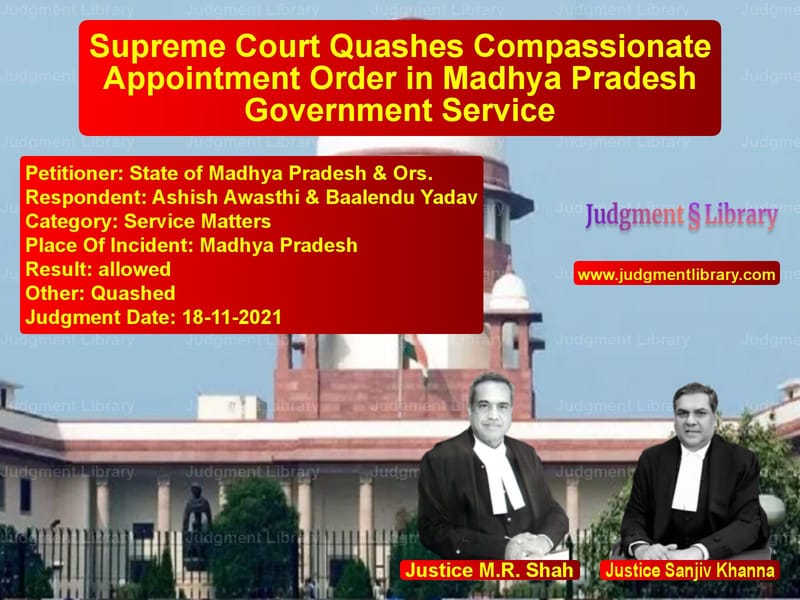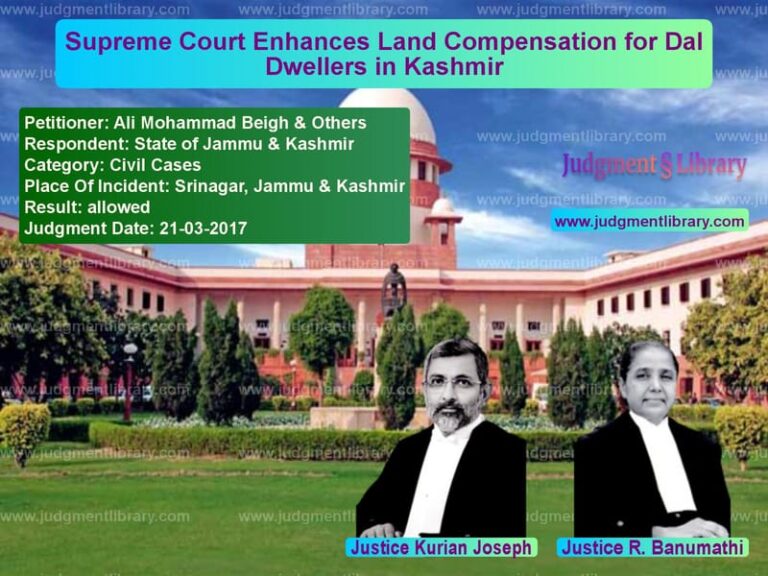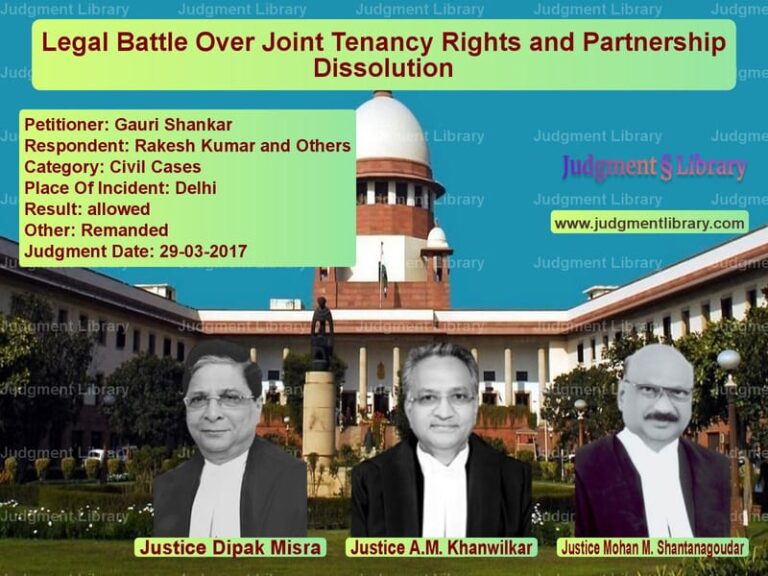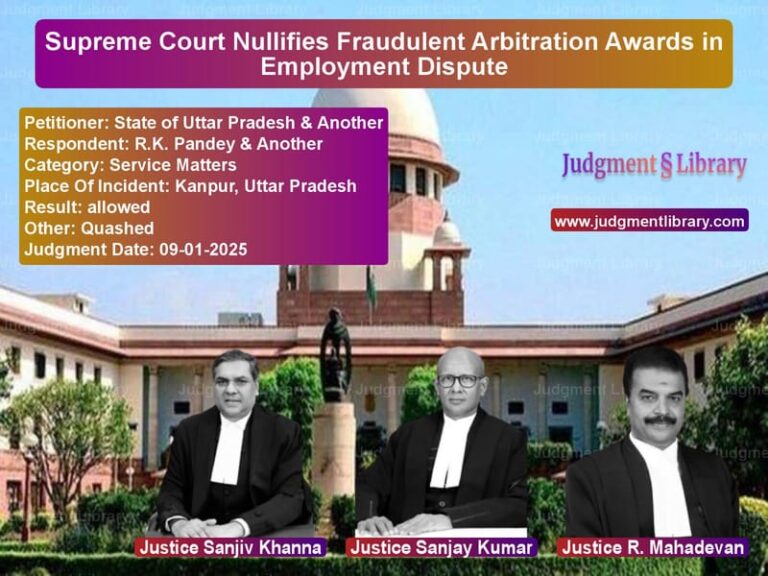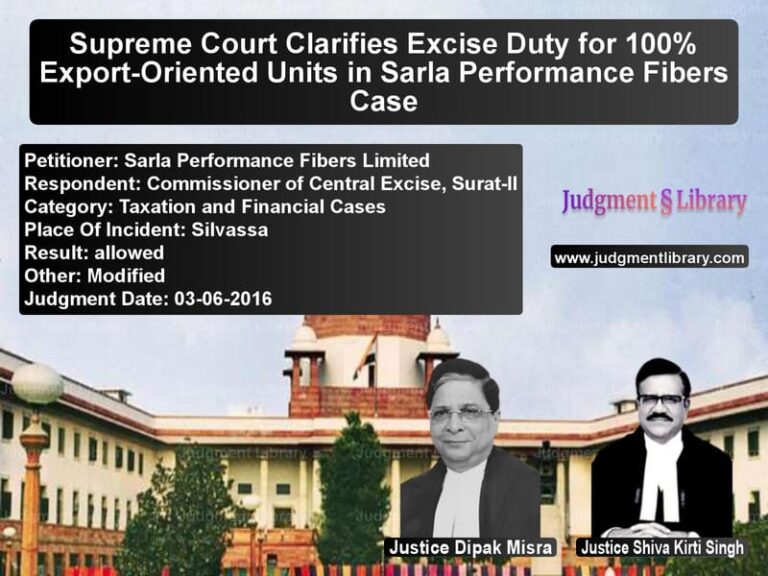Supreme Court Quashes Compassionate Appointment Order in Madhya Pradesh Government Service
The Supreme Court of India, in its judgment dated 18 November 2021, set aside the Madhya Pradesh High Court’s order directing the state government to consider compassionate appointment claims under a revised policy. The case, State of Madhya Pradesh & Ors. vs. Ashish Awasthi & Baalendu Yadav, involved claims for government employment based on the death of work-charge employees.
Background of the Case
The respondents, Ashish Awasthi and Baalendu Yadav, sought compassionate appointments after their fathers, who were work-charge employees in the Public Health Engineering Department, passed away. At the time of their deaths in 2015, the applicable policy granted a compensatory amount of Rs. 2 lakhs instead of a job. However, a policy change in 2016 allowed dependents of deceased work-charge employees to seek government appointments.
The respondents filed writ petitions before the Madhya Pradesh High Court, which initially rejected their claims. However, the Division Bench later overturned the Single Judge’s order and directed the state government to consider their applications under the 2016 policy.
State of Madhya Pradesh’s Arguments
The State of Madhya Pradesh, represented by its counsel, contended:
- The applicable policy at the time of the employee’s death (2015) did not provide for compassionate appointments.
- The 2016 amendment to the policy applied prospectively and could not be used to claim retrospective benefits.
- The Supreme Court has repeatedly held that compassionate appointments must be governed by the policy in effect at the time of death.
- The respondents had already received Rs. 2 lakhs as compensatory relief, which was the entitlement under the 2015 policy.
Respondents’ Arguments
The respondents, Ashish Awasthi and Baalendu Yadav, argued:
- The amended policy should apply to all pending cases, including those where applications had been filed after 2016.
- Compassionate appointments should be treated as a welfare measure, and denying employment would cause undue hardship.
- The High Court was correct in directing the state to consider their applications under the latest policy.
Supreme Court’s Observations
The Supreme Court bench, comprising M.R. Shah and Sanjiv Khanna, examined the High Court’s ruling and observed:
- Compassionate appointments are an exception to normal recruitment and must be strictly governed by the policy in force at the time of death.
- The 2016 amendment to the policy could not be applied retrospectively to claims arising from deaths that occurred in 2015.
- The High Court had erred in relying on a subsequent policy to grant relief.
- As per established judicial precedent, policies providing jobs to dependents must be applied based on the law at the time of death.
Key Supreme Court Rulings Cited
The Court referred to several landmark judgments, including:
- Indian Bank vs. Promila (2020) – Holding that compassionate appointments must be decided based on the policy in force at the time of death.
- State of Madhya Pradesh vs. Amit Shrivas (2020) – Declaring that revised compassionate appointment schemes cannot apply retrospectively.
- Umesh Kumar Nagpal vs. State of Haryana (1994) – Establishing that compassionate appointments should not be granted as a matter of right but as a welfare measure within strict legal parameters.
Final Judgment
The Supreme Court ruled in favor of the State of Madhya Pradesh, issuing the following directives:
- The Madhya Pradesh High Court’s orders in Writ Appeals No. 1559 of 2018 and 2003 of 2019 were quashed.
- The respondents were declared ineligible for compassionate appointments based on the 2016 policy.
- The compensatory amount of Rs. 2 lakhs received by the respondents under the 2015 policy would be reinstated if they had returned it.
- The judgment clarified that future claims for compassionate appointment must strictly follow the policy applicable at the time of the employee’s death.
Implications of the Judgment
The Supreme Court’s ruling has significant implications for public sector employment and the legal framework surrounding compassionate appointments:
- Strict Policy Adherence: The judgment reinforces that policies governing compassionate appointments cannot be applied retroactively.
- Limitation on Judicial Overreach: The decision emphasizes that courts cannot extend benefits based on policy changes that occur after an employee’s death.
- Government Recruitment Stability: The ruling ensures that compassionate appointment schemes remain structured and do not disrupt standard hiring procedures.
- Financial Compensation as an Alternative: The decision underscores the principle that monetary relief can be an acceptable substitute for government employment in cases of employee deaths.
The Supreme Court’s judgment in State of Madhya Pradesh & Ors. vs. Ashish Awasthi & Baalendu Yadav sets a clear precedent for the application of compassionate appointment policies, ensuring that employment benefits are granted only as per the rules prevailing at the time of an employee’s demise.
Petitioner Name: State of Madhya Pradesh & Ors..Respondent Name: Ashish Awasthi & Baalendu Yadav.Judgment By: Justice M.R. Shah, Justice Sanjiv Khanna.Place Of Incident: Madhya Pradesh.Judgment Date: 18-11-2021.
Don’t miss out on the full details! Download the complete judgment in PDF format below and gain valuable insights instantly!
Download Judgment: state-of-madhya-prad-vs-ashish-awasthi-&-baa-supreme-court-of-india-judgment-dated-18-11-2021.pdf
Directly Download Judgment: Directly download this Judgment
See all petitions in Public Sector Employees
See all petitions in Recruitment Policies
See all petitions in Employment Disputes
See all petitions in Judgment by Mukeshkumar Rasikbhai Shah
See all petitions in Judgment by Sanjiv Khanna
See all petitions in allowed
See all petitions in Quashed
See all petitions in supreme court of India judgments November 2021
See all petitions in 2021 judgments
See all posts in Service Matters Category
See all allowed petitions in Service Matters Category
See all Dismissed petitions in Service Matters Category
See all partially allowed petitions in Service Matters Category

